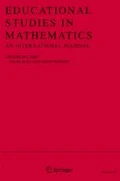Abstract
What is the place of social theory in mathematics education research, and what is it for? This special issue of Educational Studies in Mathematics offers insights on what could be the role of some sociological theories in a field that has historically privileged learning theories coming from psychology and mathematics as the main theoretical frames informing research. Although during the last 10 years the term “socio-cultural” has become part of the accepted and widespread trends of mathematics education research when addressing learning, this issue gathers a collection of papers that depart from a “socio-cultural” approach to learning and rather deploy sociological theories in the analysis of mathematics education practices. In this commentary paper, we will point to what we see to be the contributions of these papers to the field. We will do so by highlighting issues that run through the six papers. We will try to synthetize what we think are the benchmarks of the social approach to mathematics education that they propose. We will also take a critical stance and indicate some possible extensions of the use of social theory that are not addressed in this special issue but nonetheless are worth being explored for a fuller understanding of the “social” in mathematics education.
Similar content being viewed by others
References
Bishop, A., & Forgasz, H. (2007). Issues in access and equity in mathematics education. In F. Lester (Ed.), Second handbook of research on mathematics teaching and learning (pp. 1145–1168). Charlotte, NC: Information Age.
Brown, T. (2011). Mathematics education and subjectivity: Cultures and cultural renewal. Dordrecht: Springer.
Davis, Z. (2004). The debt to pleasure. The subject and knowledge in pedagogic discourse. In J. Muller, B. Davies, & A. Morais (Eds.), Reading Bernstein, researching Bernstein (pp. 44–57). London: Routledge Falmer.
Knijnik, G., & Wanderer, F. (2010). Mathematics education and differential inclusion: A study about two Brazilian time–space forms of life. ZDM, 42(3–4), 349–360.
Lerman, S. (2000). The social turn in mathematics education research. In J. Boaler (Ed.), Multiple perspectives on mathematics teaching and learning (pp. 19–44). Westport USA: Ablex.
Lerman, S. (2006). Cultural psychology, anthropology and sociology: The developing ‘strong’ social turn. In J. Maasz & W. Schloeglmann (Eds.), New mathematics education research and practice (pp. 171–188). Rotterdam: Sense.
Lundin, S. (2012). Hating school, loving mathematics: On the ideological function of critique and reform in mathematics education. Educational Studies in Mathematics, 80(1), 73–85.
Martin, D. B. (2011). What does quality mean in the context of white institutional space? In B. Atweh, M. Graven, W. Secada, & P. Valero (Eds.), Mapping equity and quality in mathematics education (pp. 437–450). New York: Springer.
Pais, A. (2013). An ideology critique of the use-value of mathematics. Educational Studies in Mathematics, 84(1), 15–34.
Pais, A., & Valero, P. (2012). Researching research: Mathematics education in the political. Educational Studies in Mathematics, 80(1–2), 9–24.
Popkewitz, T. S. (2004). The alchemy of the mathematics curriculum: Inscriptions and the fabrication of the child. American Educational Research Journal, 41(1), 3–34.
Stinson, D. (2004). Mathematics as “gate-keeper”(?): Three theoretical perspectives that aim toward empowering all children with a key to the gate. The Mathematics Educator, 14(1), 8–18.
Valero, P. (2004). Socio-political perspectives on mathematics education. In P. Valero & R. Zevenbergen (Eds.), Researching the socio-political dimensions of mathematics education: Issues of power in theory and methodology (pp. 5–24). Norwell, MA: Kluwer.
Valero, P. (2008). Discourses of power in mathematics education research: Concepts and possibilities for action. PNA: Revista de Investigación en Didáctica de la Matemática, 2(2), 43–60.
Valero, P., García, G., Camelo, F., Mancera, G., & Romero, J. (2012). Mathematics education and the dignity of being. Pythagoras. Journal of the Association for Mathematics Education of South Africa, 33(2), Art. #171, 171–179.
Žižek, S. (1993). Tarrying with the negative. Durham, NC: Duke University Press.
Žižek, S. (2008). The plague of fantasies [1997] (1st ed.). London: Verso.
Author information
Authors and Affiliations
Corresponding author
Rights and permissions
About this article
Cite this article
Pais, A., Valero, P. Whither social theory?. Educ Stud Math 87, 241–248 (2014). https://doi.org/10.1007/s10649-014-9573-z
Published:
Issue Date:
DOI: https://doi.org/10.1007/s10649-014-9573-z



